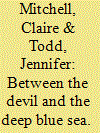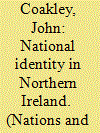| Srl | Item |
| 1 |
ID:
079974


|
|
|
|
|
| Publication |
2007.
|
| Summary/Abstract |
National identity is a symbolically complex configuration, with shifts of emphasis and reprioritisations of content negotiated in contexts of power. This paper shows how they occur in one post-conflict situation - Northern Ireland - among some of the most extreme of national actors - evangelical Protestants. In-depth interviews reveal quite radical shifts in the content of their British identity and in their understanding of and relation to the Irish state, with implications for their future politics. The implications for understanding ethno-religious nationalism, nationality shifts and the future of Northern Ireland are drawn out
|
|
|
|
|
|
|
|
|
|
|
|
|
|
|
|
| 2 |
ID:
079977


|
|
|
|
|
| Publication |
2007.
|
| Summary/Abstract |
The relationship between population growth, ethnic diversity and conflict in the developing world is little understood but highly relevant to a large number of countries. In order to understand this relationship, I focus on a case study of local conflict in the district of Kibaale in western Uganda. Uganda's unusually high population growth rate and high level of ethnic diversity are often seen to have led to communal violence in Kibaale. Yet I claim that while this conflict was indeed sparked by population growth and resultant internal migration, it has nothing to do with ethnic diversity per se. Rather, the conflict in Kibaale has much more to do with nativism and the salience of claims to indigeneity at the local level. Kibaale may thus prove something of a warning sign for other parts of Uganda and other developing countries with similar high population growth and little success in nation-building
|
|
|
|
|
|
|
|
|
|
|
|
|
|
|
|
| 3 |
ID:
079972


|
|
|
|
|
| Publication |
2007.
|
| Summary/Abstract |
This article critically investigates the social construction of 'identity talk' in relation to the Irish Question in the 1980s. Our contention is that the utilisation of 'identity' imagined people as bounded groups in a particular way - as the two traditions or communities in Northern Ireland - and that this way of imagining people was deployed against 'will'-based conceptions of politics. The first part of the article places the emergence of 'identity' as a concept in its historical context and suggests four phases in the use of 'identity'. The second part focuses on 'identity' as a concept and locates its emergence within the meta-conflict regarding Northern Ireland. The article concludes by reflecting on Brubaker and Cooper's (2000) analysis of 'identity' as a category of analysis in light of our case study of 'identity' as a category of practice regarding the Irish Question
|
|
|
|
|
|
|
|
|
|
|
|
|
|
|
|
| 4 |
ID:
079975


|
|
|
|
|
| Publication |
2007.
|
| Summary/Abstract |
This article examines the theoretical problem of understanding the relationship between personal and social dimensions of national identity. It does this by relating ethnographic data collected during a study of a merger between a Scottish and an English bank to three conceptual frameworks. First, it considers Michael Billig's thesis of 'banal nationalism'. Then it addresses Anthony P. Cohen's concept of 'personal nationalism'. Finally, it adapts a conception of the relationship between personal and social identity found in the recent work of Derek Layder. Based on this it argues that national identities, like all identities, are rendered salient for persons when they seem to address personal issues of power over one's life, and that the various social organisational settings through which people realise control over their lives (in this case, the bank) are thus crucial contexts for understanding people's attachments to identities, national and otherwise.
|
|
|
|
|
|
|
|
|
|
|
|
|
|
|
|
| 5 |
ID:
079971


|
|
|
|
|
| Publication |
2007.
|
| Summary/Abstract |
This article addresses a set of fundamental, long-term factors associated with the Northern Ireland conflict: the pattern of underlying values and attitudes, especially those related to identity, that have helped to shape the nature of intercommunal competition. Using all generally available public opinion data, the article explores in particular the nature of national identity and of related forms of belonging for political behaviour. It notes the mutually reinforcing character of political loyalties within the Protestant community (where national identity, communal affiliation, constitutional preference and party support tend to coincide in a 'Protestant-unionist' package) and the failure of this to be matched within the Catholic community (where the components of the 'Catholic-nationalist' package are less closely interrelated). It concludes by speculating about the implications of these value configurations for political development, suggesting that they are unlikely to contribute to any fundamental political change in Northern Ireland in the short or medium term
|
|
|
|
|
|
|
|
|
|
|
|
|
|
|
|
| 6 |
ID:
079976


|
|
|
|
|
| Publication |
2007.
|
| Summary/Abstract |
Following the successful referendum of May 2006, Montenegro became the last of the former Yugoslav republics to opt for an independent state. Only fifteen years earlier, when the Socialist Federal Republic of Yugoslavia collapsed, Montenegro was resolute to continue the Yugoslav state-formation in a union with Serbia. This paper attempts to answer the following questions: Why did it take so much longer for the Montenegrin population to follow the experience of other republics in its decision on independence? How can one explain a staggering change in public opinion on questions of national self-determination over such a short time-span? And, finally, what are the dominant discourses of "Montenegrin-ness"? The authors argue that the answers to these questions are to be found in the particularities of Montenegro's historical development, and especially in the structural legacies of state socialism. The consequence of these developments was the formation of two separate Montenegrin national ideologies: one which sees Montenegrins as ethnically Serb, and the other that defines Montenegrins in civic terms. The paper concludes that these two divergent trajectories of nation-formation in Montenegro are largely the unintended consequence of intensive state-building, cultural and political modernisation and, most of all, the gradual politicisation and institutionalisation of high culture
|
|
|
|
|
|
|
|
|
|
|
|
|
|
|
|
| 7 |
ID:
079973


|
|
|
|
|
| Publication |
2007.
|
| Summary/Abstract |
The study of minorities is central to research in ethnicity and nationalism. But there are cases where the precise nature of the minority is not easy to determine. One view of Southern Irish Protestants is that in the decades after independence they transformed themselves (or were transformed) from British nationals to Irish nationals or, alternatively, from a British ethnic to an Irish religious minority. This paper argues that treating the (past) British dimension of Irish Protestant identity as ethnic or national misconceives it and overlooks the historically deep Irish context of Protestant identity. One consequence of this is the neglect of the specifically Irish roots of residual tensions in Catholic-Protestant relationships. The themes of the paper are exemplified with case material drawn from research on Protestants and Catholics in rural West Cork.
|
|
|
|
|
|
|
|
|
|
|
|
|
|
|
|